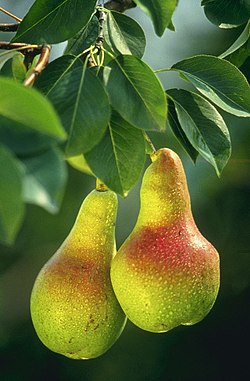груша
Hello, you have come here looking for the meaning of the word груша. In DICTIOUS you will not only get to know all the dictionary meanings for the word груша, but we will also tell you about its etymology, its characteristics and you will know how to say груша in singular and plural. Everything you need to know about the word груша you have here. The definition of the word груша will help you to be more precise and correct when speaking or writing your texts. Knowing the definition ofгруша, as well as those of other words, enriches your vocabulary and provides you with more and better linguistic resources.

груша
See also: Груша
Belarusian
Alternative forms
Etymology
From Proto-Slavic *gruša. Cognate with Russian гру́ша (grúša), Ukrainian гру́ша (hrúša).
Pronunciation
Noun
гру́ша • (hrúša) f inan (genitive гру́шы, nominative plural гру́шы, genitive plural груш)
- (botany) pear (fruit or tree)
- (sports) punching bag (boxing equipment of such shape)
Declension
Declension of гру́ша (inan hard fem-form accent-a)
| singular | plural | |
|---|---|---|
| nominative | гру́ша hrúša |
гру́шы hrúšy |
| genitive | гру́шы hrúšy |
груш hruš |
| dative | гру́шы hrúšy |
гру́шам hrúšam |
| accusative | гру́шу hrúšu |
гру́шы hrúšy |
| instrumental | гру́шай, гру́шаю hrúšaj, hrúšaju |
гру́шамі hrúšami |
| locative | гру́шы hrúšy |
гру́шах hrúšax |
| count form | — | гру́шы1 hrúšy1 |
1Used with the numbers 2, 3, 4 and higher numbers after 20 ending in 2, 3, and 4.
Derived terms
- грушападо́бны (hrušapadóbny)
References
- “груша” in Belarusian–Russian dictionaries and Belarusian dictionaries at slounik.org
Russian

Etymology
Inherited from Proto-Slavic *gruša, a variant of *kruša.
Pronunciation
Noun
гру́ша • (grúša) f inan (genitive гру́ши, nominative plural гру́ши, genitive plural груш, relational adjective гру́шевый, diminutive гру́шка)
- (botany) pear (fruit or tree)
- 1893, Антон Чехов , “VIII”, in Рассказ неизвестного человека; English translation from Constance Garnett, transl., An Anonymous Story, 1917:
- Когда́ я верну́лся домо́й, Зинаи́да Фёдоровна лежа́ла в гости́ной на софе́ и е́ла гру́шу.
- Kogdá ja vernúlsja domój, Zinaída Fjódorovna ležála v gostínoj na sofé i jéla grúšu.
- When I reached home Zinaida Fyodorovna was lying on the sofa in the drawing-room, eating a pear.
- 1905, Фёдор Сологуб , chapter III, in Мелкий бес; English translation from John Cournos and Richard Aldington, transl., The Little Demon, New York: Alfred A. Knopf, 1916:
- Они́ посиде́ли обня́вшись, пото́м опя́ть запляса́ли. И так не́сколько раз повторя́лось: то попля́шут, то отдохну́т под гру́шею, на скаме́ечке и́ли пря́мо на траве́.
- Oní posidéli obnjávšisʹ, potóm opjátʹ zapljasáli. I tak néskolʹko raz povtorjálosʹ: to popljášut, to otdoxnút pod grúšeju, na skaméječke íli prjámo na travé.
- They sat a while in each other's embrace, then got up and once more began to dance. This they repeated several times: now they danced, now they rested under the pear tree, upon the bench, or simply on the grass.
- (sports) punching bag (boxing equipment of such shape)
Declension
Declension of гру́ша (inan fem-form sibilant-stem accent-a)
Pre-reform declension of гру́ша (inan fem-form sibilant-stem accent-a)
Derived terms
Compound words:
- грушеви́дный (gruševídnyj)
Compounds:
- земляна́я гру́ша f (zemljanája grúša)
- Phrases
- окола́чивать гру́ши impf (okoláčivatʹ grúši)
- трясти́ как гру́шу impf (trjastí kak grúšu)
- Riddles
- виси́т гру́ша, нельзя́ ску́шать (visít grúša, nelʹzjá skúšatʹ)
Descendants
References
- Vasmer, Max (1964–1973) “груша”, in Oleg Trubachyov, transl., Этимологический словарь русского языка (in Russian), Moscow: Progress
- Chernykh, P. Ja. (1999) “груша”, in Историко-этимологический словарь русского языка (in Russian), 3rd edition, volume 1 (а – пантомима), Moscow: Russian Lang., →ISBN, page 223
- Shansky, N. M., editor (1972), “груша”, in Этимологический словарь русского языка (in Russian), volume 1, number 4 (Г), Moscow: Moscow University Press, page 186
- Šanskij, N. M. (2004) “груша”, in Školʹnyj etimologičeskij slovarʹ russkovo jazyka (in Russian), Moscow: Drofa
- Krylov, G. A. (2004) “груша”, in Этимологический словарь русского языка (in Russian), Saint Petersburg: Victory, →ISBN
- Shaposhnikov, A. K. (2010) “груша”, in Этимологический словарь современного русского языка (in Russian), volumes 1: (А – Начальство), Moscow: Flinta; Nauka, →ISBN, page 201
Further reading
- Dal, Vladimir (1880–1882) “груша”, in Толковый Словарь живаго великорускаго языка (in Russian), 2nd edition, Publication of the bookseller-typographer Wolf, M. O.
Ukrainian
Etymology
From Proto-Slavic *gruša, a variant of *kruša.
Pronunciation
Noun
гру́ша • (hrúša) f inan (genitive гру́ші, nominative plural гру́ші, genitive plural груш, relational adjective груше́вий)
- (botany) pear (fruit or tree)
- Synonym: гру́шка f (hrúška)
- (sports) punching bag (boxing equipment of such shape)
Declension
| singular | plural | |
|---|---|---|
| nominative | гру́ша hrúša |
гру́ші hrúši |
| genitive | гру́ші hrúši |
груш hruš |
| dative | гру́ші hrúši |
гру́шам hrúšam |
| accusative | гру́шу hrúšu |
гру́ші hrúši |
| instrumental | гру́шею hrúšeju |
гру́шами hrúšamy |
| locative | гру́ші hrúši |
гру́шах hrúšax |
| vocative | гру́ше hrúše |
гру́ші hrúši |
Derived terms
- гру́шка f (hrúška)
- грушоподі́бний (hrušopodíbnyj)
References
- Bilodid, I. K., editor (1970–1980), “груша”, in Словник української мови: в 11 т. (in Ukrainian), Kyiv: Naukova Dumka
- “груша”, in Горох – Словозміна (in Ukrainian)
Yakut
Etymology
Borrowed from Russian груша (gruša).
Noun
груша • (grusha)
